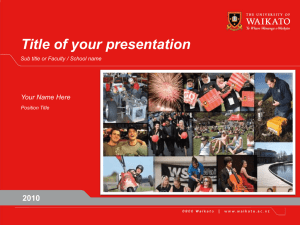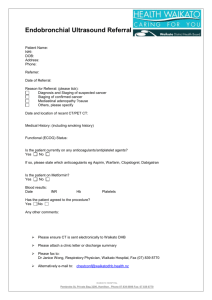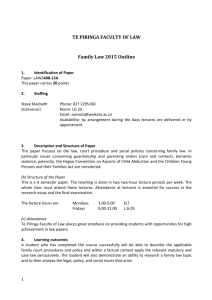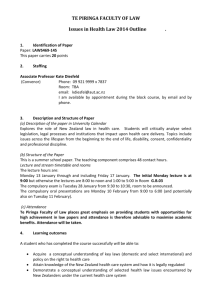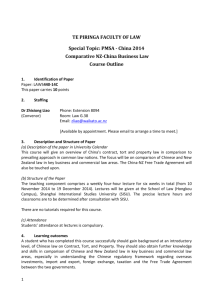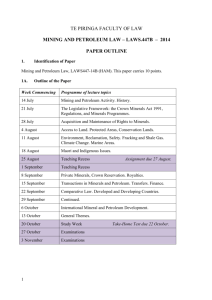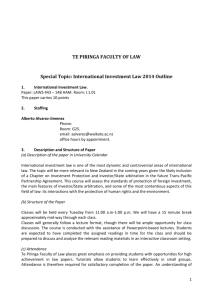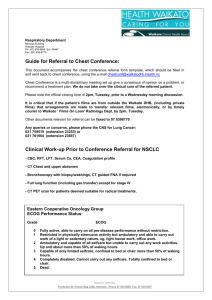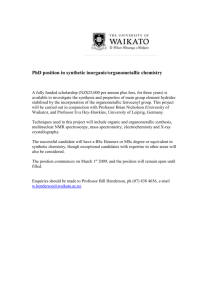LAWS441-12C Art Crime during Armed Conflict
advertisement
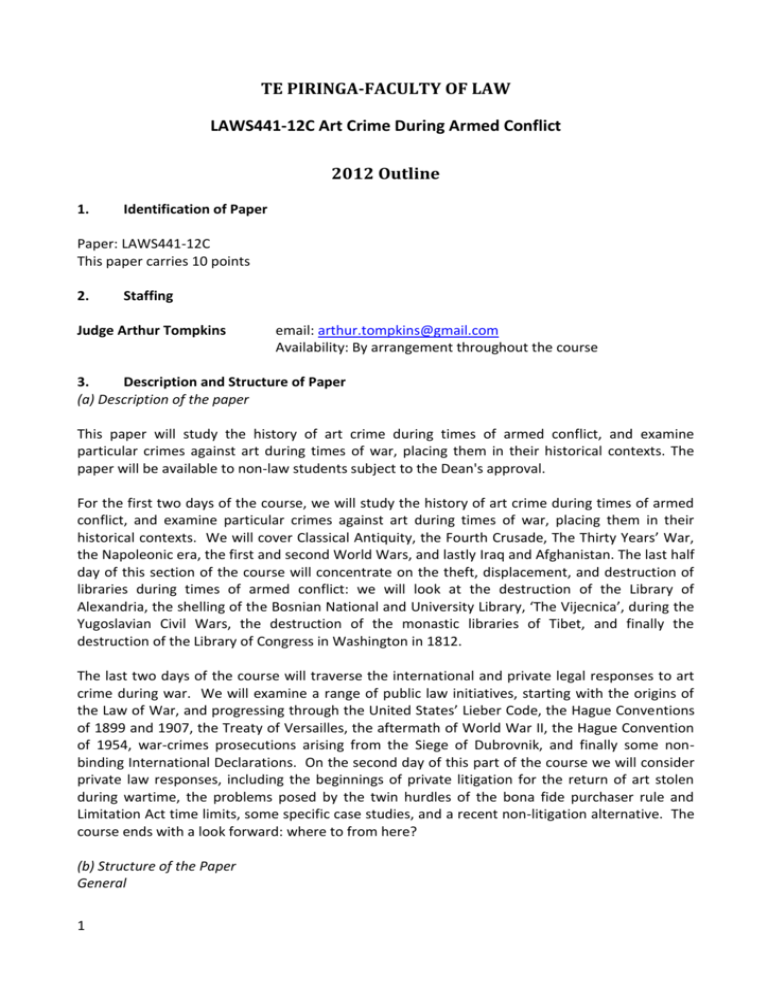
TE PIRINGA-FACULTY OF LAW LAWS441-12C Art Crime During Armed Conflict 2012 Outline 1. Identification of Paper Paper: LAWS441-12C This paper carries 10 points 2. Staffing Judge Arthur Tompkins email: arthur.tompkins@gmail.com Availability: By arrangement throughout the course 3. Description and Structure of Paper (a) Description of the paper This paper will study the history of art crime during times of armed conflict, and examine particular crimes against art during times of war, placing them in their historical contexts. The paper will be available to non-law students subject to the Dean's approval. For the first two days of the course, we will study the history of art crime during times of armed conflict, and examine particular crimes against art during times of war, placing them in their historical contexts. We will cover Classical Antiquity, the Fourth Crusade, The Thirty Years’ War, the Napoleonic era, the first and second World Wars, and lastly Iraq and Afghanistan. The last half day of this section of the course will concentrate on the theft, displacement, and destruction of libraries during times of armed conflict: we will look at the destruction of the Library of Alexandria, the shelling of the Bosnian National and University Library, ‘The Vijecnica’, during the Yugoslavian Civil Wars, the destruction of the monastic libraries of Tibet, and finally the destruction of the Library of Congress in Washington in 1812. The last two days of the course will traverse the international and private legal responses to art crime during war. We will examine a range of public law initiatives, starting with the origins of the Law of War, and progressing through the United States’ Lieber Code, the Hague Conventions of 1899 and 1907, the Treaty of Versailles, the aftermath of World War II, the Hague Convention of 1954, war-crimes prosecutions arising from the Siege of Dubrovnik, and finally some nonbinding International Declarations. On the second day of this part of the course we will consider private law responses, including the beginnings of private litigation for the return of art stolen during wartime, the problems posed by the twin hurdles of the bona fide purchaser rule and Limitation Act time limits, some specific case studies, and a recent non-litigation alternative. The course ends with a look forward: where to from here? (b) Structure of the Paper General 1 This is a semester C paper. The teaching component comprises 24 contact hours for 10 points. Course learning activities will comprise pre-course reading, formal presentaions by Course Instructor, and in-class discussion. Lecture and stream timetable and rooms The lecture hours are: Mon 13 Feb 10am – 1pm Mon 13 Feb 2pm – 5pm Tues 14 Feb 10am – 1pm Tues 14 Feb 2pm – 5pm Wed 15 Feb 10am – 1pm Wed 15 Feb 2pm – 5pm Thur 16 Feb 10am – 1pm Thur 16 Feb 2pm – 5pm Fri 17 Feb 10am – 1pm Fri 17 Feb 2pm – 5pm 4. LAW.G.04 LAW.G.04 LAW.G.04 LAW.G.04 LAW.G.04 LAW.G.04 LAW.G.04 LAW.G.04 J.1.10 J.1.10 Learning outcomes By the end of this course students will have gained: 5. A historical overview of crimes against art during times of war, from ancient to modern times; An understanding of the reasons why such crimes are committed, and how those reasons change depending on the historical context; Knowledge of the public law instruments and institutions, and efforts taken by the international community over the years, to endeavour to protect art from such depredations; and Knowledge of the private law remedies available to redress such crimes. Workload Students should expect to spend 100 hours in total on this paper. In addition to lecture attendance, significant time will need spent on background and complementary reading. Students should allow for periods of more-focused research time in the preparation of assignments and presentations. All law students are required to purchase, for use in all law papers, a copy of McLay, Murray & Orpin, New Zealand Law Style Guide, (2nd Edition, Thomson Reuters, 2011). This is available from Bennetts, at an approximate price of $24. Reading material will be made available on the course site on (http://elearn.waikato.ac.nz). Any such material is provided on the following terms: Moodle University of Waikato owns the intellectual property rights, including copyright, in and to this site, or has acquired the necessary licenses to display the material on the site. As a student of the Te 2 Piringa-Faculty of Law, you are granted a limited license to use (access, display or print a single copy) the material from the papers in which you are enrolled for the purposes of participating in the paper only, provided the information is not modified. Materials may not under any circumstances be copied, stored, distributed or provided in any form or method whatsoever to any third party. Any other use of the material is prohibited. None of the material may be otherwise reproduced, reformatted, republished or re-disseminated in any manner or form without the prior written consent of University of Waikato. To obtain such consent, please contact the Te Piringa-Faculty of Law. (ii) Recommended pre-course reading Prior to the course, students may elect to read: Chamberlain, R. Loot: The Heritage of Plunder. (Thames and Hudson, London, 1983; Sutton 2003) Charney, N. (Ed). Art & Crime: Exploring the Dark Side of the Art World (Praeger, 2009) Nicholas, L. The Rape of Europa (Vintage, 1995) Interesting and relevant historical fiction, for lighter pre-course reading, could include: 7. Brooks, Geraldine. People of the Book. (Fourth Estate, HarperCollins, 2008) Houghteling, Sara. Pictures at an Exhibition. (Vintage, 2010) Online support Online support for this paper is provided via Moodle: http://elearn.waikato.ac.nz 8. Assessment a) Requirements for assessed work School procedures for the presentation of course work are set out in the Te Piringa Faculty of Law Undergraduate Handbook which is available from http://www.waikato.ac.nz/law/undergraduate. See also paragraph 11 on referencing guidelines and plagiarism. Assignment resources are available online at http://www.waikato.ac.nz/law/student/ b) Coursework: Final Examination Ratio: 100/0 c) Assessment Components Assessment Component 1) Class Attendance 2) Participation 3) Assignment % of Total 5% 20% 75% Due Date n/a n/a Thursday 5 April 2012 Students will receive a mark based on the given weightings for Class Attendance, Participation, and the Assignment, or, just the Assignment with 100% weighting – whichever mark is higher. 3 1) Class attendance (5%) 2) Class participation (20%): Active participation will be encouraged during class 3) Assignment (75%): An essay, of up to 4000 words (excluding references and bibliography) on a topic of your choice and formulation, chosen from any of the areas covered in the course, or, with approval, on any other topic dealing with Art Crime in War, is to be submitted electronically no later than Thursday 5 April 2012. d) Handing in, marking time and collection All assignments must be submitted electronically through Moodle (http://elearn.waikato.ac.nz). See Te Piringa Faculty of Law Undergraduate Handbook, available at http://www.waikato.ac.nz/law/undergraduate. It is the policy of Te Piringa Faculty of Law to return marked work to students within five weeks of submission. If you require assistance with Moodle, or encounter any problems, please contact the Help Desk. You can send a message to Help Desk by using the instant message service in your paper (from the participants list within the People block). Alternatively, you can email them directly at help@waikato.ac.nz or call 838 4008. e) Measurement of Achievement Achievement in examinations and tests will be measured primarily in terms of levels of understanding and knowledge gained. Achievement in assignments will be measured also in terms of fluency and accuracy of expression and referencing. f) Management of assessment deadlines, process for requesting extensions and special consideration, and for appeals (i) Extensions Students are required to complete and submit all internal assessment by specified dates. The meeting of deadlines is a mark of professionalism and its enforcement is essential for fairness to all students taking the paper. Handing in course work on or before the due in date also facilitates the timely return of marked work by academic staff. Students should meet requirements as to time deadlines for course work, or make a request for an extension or special consideration in appropriate circumstances (see Undergraduate Programmes Manual available from the School of Law Undergraduate website http://www.waikato.ac.nz/law/undergraduate/). Failure to comply with requirements as to the time deadlines for internal assessment without having successfully applied either for an extension or special consideration with supporting evidence before the due date will result in deduction of 2.5 marks for each day the work is late. Lateness of more than a week may result in the work not being marked. No deadlines may be extended beyond two weeks after the last teaching day of the semester(s) in which the paper is taught as final grades must go to the Board of Examiners at this time. Unless an extension in writing has been granted, a lecturer may refuse to accept a piece of work which is submitted after the specified date, and automatically award it no mark, or may lower the mark as a penalty for lateness. Applications for extension, on the form obtainable from the Resource Room, must be submitted to the Chief Examiner or nominee. Students should not submit the extension form to the lecturer, nor should students seek extensions from the lecturer via other forms of communication. Extensions will be granted only on evidence of illness, family bereavement, or serious personal accidents or circumstances. Please note that too many assignments due at the same time is NOT an acceptable reason, neither are claims that computers and/or printers have crashed. Account will be taken of the time in which the student has had to complete the internal 4 assessment before the supervening event occurred. It will be important to consider if the grant of the extension will give the student in question an unfair advantage over other students. A maximum period of 14 days will be given as an extension unless there are exceptional circumstances. In determining applications the Chief Examiner or nominee may consult with the Convenor or lecturer of the relevant paper. When the Chief Examiner or nominee has made a decision on the application for extension, the Resource Room Administrative Assistant will advise the student of the decision by email. Following this, the extension form will be given to the relevant lecturer who will retain it until after the assignment is marked and returned to students. The form will then be placed on the student’s file. It should be noted that if an extension of longer than 14 days is granted, the assignment will not be automatically printed out and delivered to the lecturer, therefore the lecturer is responsible for ensuring the assignment is printed. In appropriate cases, when a student’s application for extension is declined the Chief Examiner or nominee will inform the student of the process for applying for special consideration. (ii) Special Consideration The Assessment Regulations 2005 as set out in the University Calendar 2012 list in detail the university-wide policies and procedures, which apply concerning missed examinations, impaired performance or impaired preparation time for an examination, and missed or impaired course work. Students are responsible for ensuring that they comply with these regulations. Application forms for special consideration for internal assessment are available from the Resource Room. (iii) Appeals (University Calendar 2012, Assessment Regulations 2005, Reg. 24) A student may appeal against any decision taken under these regulations. An appeal, comprising a written statement of the circumstances of the appeal, together with supporting evidence if available, must be submitted by the student in writing to the Head of Student & Academic Services not more than seven days after the date on which notification of the relevant decision is received. Appeals under this section are considered and decided by the Deputy Vice-Chancellor by delegated authority of the Academic Programmes Committee. A decision by the Deputy Vice-Chancellor is notified in writing, and is final. 9. University Calendar Regulations and Policies Your attention is drawn to the following regulations and policies, which are published in the University Calendar 2012: Assessment Regulations 2005 Student Discipline Regulations 2008 Computer Systems Regulations 2005 Policy on the Use of Māori for Assessment Student Research Regulations 2008 Ethical Conduct in Human Research and Related Activities Regulations 2008. 10. Nil. Links to other papers 11. Fees Refer to http://calendar.waikato.ac.nz/admission/tableoffeesandcharges.html. 12. 5 Referencing guidelines and caution against plagiarism (a) (b) (c) Referencing must be in accordance with the New Zealand Law Style Guide. All written work submitted for the purposes of assessment must be your own work. Copying or paraphrasing all or part of another person’s work, be it published or unpublished, without clear attribution, is plagiarism. Plagiarism is misconduct and is dealt with under the disciplinary procedures of the University as outlined in the Student Discipline Regulations 2008 in the University Calendar. “Plagiarism means presenting as one’s own work the work of another, and includes the copying or paraphrasing of another person’s work in an assessment item without acknowledging it as the other person’s work through full and accurate referencing; it applies to assessment presented through a written, spoken, electronic, broadcasting, visual, performance or other medium.” See section 3, Assessment Regulations (2012 Calendar) The Te Piringa Faculty of Law’s policy regarding plagiarism is contained in the Te Piringa Faculty of Law Undergraduate Handbook and the Te Piringa Faculty of Law Undergraduate Programmes Manual, available from http://www.waikato.ac.nz/law/undergraduate/. 13. Health and safety The Law School’s Health and Safety representative is Ms Alison Saunders who is in Room Law G44 at ext 4167. 14. Class representation See p 68 Te Piringa Faculty of Law Undergraduate Handbook available from http://www.waikato.ac.nz/law/undergraduate/. Contact details for the Student Representation Coordinator, Academic Services Division, are as follows: Samantha Whittle, Student Services, ext. 6264, CHSSG.25 email: student.reps@waikato.ac.nz. 15. Complaints procedures The brochure Student Concerns and Complaints Policy provides details of the University’s process for handling concerns and complaints and is available from Faculty and School Offices, The Gateway and Student Services Division and is contained in the Calendar 2012. See also the document Student Support Structure at Te Piringa Faculty of Law, available from the Resource Room. 6 LECTURE SCHEDULE SEMESTER C DAY ONE: Introductions; Classical Antiquity; the Fourth Crusade; the Thirty Years’ War; Napoleon Introductions; course structure; course assessment. Why does art suffer during wartime? Classical Antiquity and the Fourth Crusade The Stele of Hammurabi Classical Antiquity Corinth, 146BC Cicero’s prosecution of Verres, 70BC The Temple in Jerusalem, 70AD The Arch of Titus The 4th Crusade Four Horses of St Marks The 4th Crusade, 1202 The Sack of Constantinople, 1203 The Basilica of San Marco The Thirty Years’ War, 1618 – 1648 The rise of the connoisseur prince: the “Taste of Angels” Emperor Rudolf II The Palatine Library The Battle of White Mountain, 1620 The Treaty of Tolentino, 1797 King Gustavus Adolphus Queen Christina The Sack of Prague, 1648 Napoleon 7 The Louvre The French Revolution, 1789 The Invasion of Italy o The Treaty of Modena, 1796 o Rome The Treaty of Tolentino, 1796 The Laocoon The Apollo Belvedere o Venice The Four Horses Wedding at Cana The Paris ‘Triumph’ Aachen Baron Dominique Vivant Denon Egypt o The Rosetta Stone o General de Menou o W.R. Hamilton The Defeat of Napoleon: The Four Horses return The theft of Goya’s Portrait of the Duke of Wellington DAY TWO: World Wars I and II, and Iraq/Afghanistan World War I Louvain Library Reims Cathedral The Treaty of Versailles: Articles 245, 246, 247 The Skull of the Sultan Mkwawa The Ghent Altarpiece The Last Supper World War II 8 Pre-War: The rise of the Nazi Party Hitler Degenerate Art Linz Czechoslovakia The Hay Harvest The Art of Painting Why was art such a Nazi obsession? World War II: The Phony War Einsatzstab Reichsleiter Rosenberg (‘ERR’) Hermann Goering Jeu de Paume The Astronomer Rose Valland M-Atkion The Ghent Altarpiece and The Last Supper Madame Camus Hitler’s Birthday album Russia: The Hermitage The Amber Room The Monuments Men: The Roberts Commission Sicily and Italy Leptis Magna Naples Eisenhower’s Order, 29 Dec 1943 Rome Florence Afghanistan and Iraq: The Silk Road The Bamiyan Buddhas Baghdad, 1258 The First Iraq war, 2003 10/11 and 12/13 April The Bactrian Horde DAY THREE: Lost Libraries and Burning Books The Bonfire of the Vanities Savonarola Florence, 7 Feb 1497 Libraries: “The Healing Place of the Soul” Alexandria Julius Caesar, 48BC Patriarch Theophilus, c.400AD Caliph Omar, 7th century The new Library of Alexandria The Bosnian National and University Library: The Vijecnica 9 The Sarajevo Haggadah The Alhambra decree, 1492 Cisneros The Siege of Sarajevo 25/26 August, 1992 Nikola Koljevic Tibet: The Land of Snows Control by China Tibetan Buddhism The Potala Palace The exile of the Dalai Lama and the Tibetan Rebellion, 1959 The Cultural Revolution Dharamsala The Library of Congress “Mr Madison’s War” 24 August 1812 Thomas Jefferson DAY FOUR: The public international law response Introduction Public International Law Oxford English Dictionary The Statute of the International Court of Justice Customary International law Private law The Law of War Grotius De Vettel The Peace of Westphalia, c.1648 The Congress of Vienna, 1815 The Lieber Code 10 The Battle of Waterloo, 1815 Francis Lieber, 1800 - 1872 The Lieber Code, 1863 Articles 31, 34, 35, 36 The Declaration of Brussels, 1874 The Oxford Code, 1880 The Hague Conventions, 1899 and 1907 Tsar Nicholas The Conventions The 4th Convention Articles 25, 26, 27, 28, 56 World War I The Treaty of Versailles, 1919 Articles 245, 246, 247 The Treaty of St Germain, 1919 Articles 195, 196 The Treaty of Trianon, 1920 The St Ildefonso Triptych The Treaty of Riga, 1921 The Zaluski Library The League of Nations World War II The Spanish Civil War, 1936-1939 Guernica Pre-War exchanges Eisenhower’s General order, 26th May 1944 Dumbarton Oaks, 1944 The San Francisco Conference, 1945 The Nuremberg Trials, 1945-1946 Indictment: Alfred Rosenberg Judgment of the Tribunal ERR Alfred Rosenberg The Nuremberg Principles, 1950 The Universal Declaration of Human Rights, 1948 The Geneva Conventions, 1949 The Atlantic Charter, 1941 The Convention for the Protection of Cultural Property in the Event of Armed Conflict, 1954 11 “Military necessity” Articles 1, 4 The 1954 Protocol Moveable property The 1999 Protocol Military necessity; Enhanced protection; Individual criminal responsibility Yugoslavia: the bombardment of Dubrovnik, 6th December 1991 The Yugoslav Wars, 1991 – 1999 The International Criminal Tribunal for the Former Yugoslavia Article 3 The siege of Dubrovnik 6th December 1991 ICTY proceedings Miodrag Jokic Pavle Strugar Non-binding International Declarations The London Declaration, 1943 Bretton Woods, 1944 The Monuments Men The Ghent Altarpiece Hans van Meergeren Post 1990 activity The Washington Conference, 1998 The Vilnius Forum, 2000 The Prague Conference, 2009 The Washington Principles DAY FIVE: The private law response The Marquis de Somerueles, 1813 Mr Madison’s War Sir Alexander Croke The Petition The Judgment Private Claims in National Courts 12 Statutes of Limitation Nemo dat quod non habet The bona fide purchaser for value without notice Menzel -v- List, 1966 Adele-Bloch Bauer I Portrait of Wally The UK’s Holocaust (Return of Cultural Objects) Act 2009 Spoliation Advisory Panel The Benevento Missal The Glaser drawings The Coronation of the Virgin The future - where to from here? An International Art Crime Tribunal? End of Course 13
